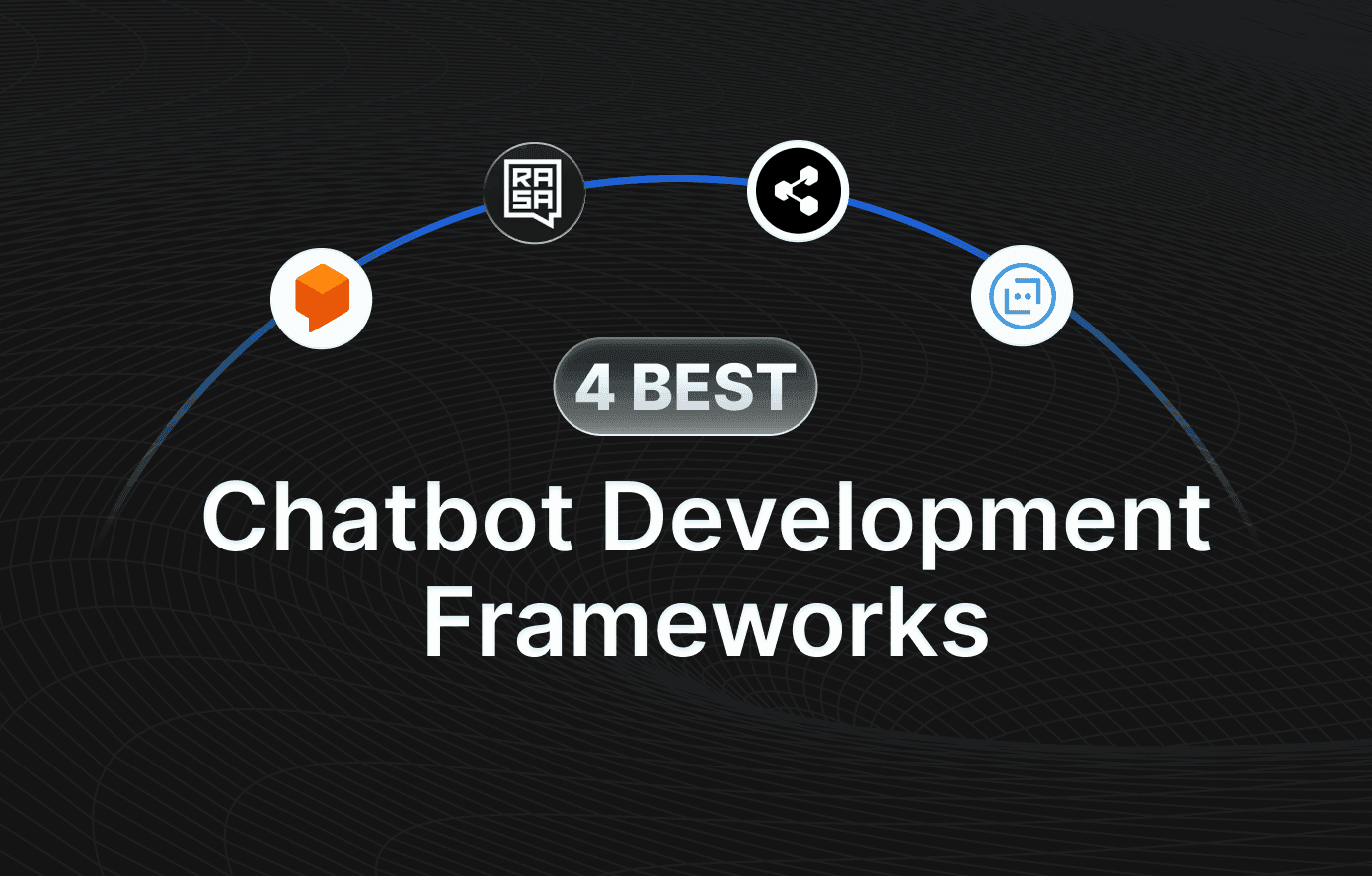
Let’s build your chatbot today!
Launch a no-code WotNot agent and reclaim your hours.
*Takes you to quick 2-step signup.
Have you ever wondered what a to-do list of an HR Manager looks like?
It’s full of following up with recruitment processes, ongoing employee retention practices, pending payroll and appreciation, upcoming training and development programs — the list goes on.
Kind of intimidating, isn’t it?
Now, on top of these tasks, add the massive changes that the HR department underwent in the past few years.
From managing remote work to virtually onboarding and training employees, the industry experienced a paradigm shift in how we work, where we work, and when we work.
Luckily HR departments had numerous tools at their disposal which made all this possible.
And one of the primary tools in this virtual HR tech stack was Human Resource Chatbots.
So what are HR chatbots and why are they important?
This article talks about everything about HR chatbots, and why you should invest in one for your organization.
Let’s go.
What is an HR Chatbot?
HR chatbots are automated conversational tools that simulate dialogue with candidates and employees. Their motive is to ultimately aid the human resources department to automate essential functions like:
Scheduling interviews
Providing reference material to employees and candidates
Managing referrals
A part of the HR chatbot is also a recruitment chatbot. Forbes defines recruitment chatbots as “conversational interface platforms that perform the preliminary recruitment process. These chatbots are powered with AI and NLP capabilities which make them more disruptive and powerful.”
Recruitment and HR chatbots have taken the industry by storm. In fact, Gartner predicts that 75% of HR service management inquiries will be initiated through conversational platforms. Most of the tedious HR processes that waste immense time and are unproductive for recruiters are easily automated via HR chatbots.
Over time, recruitment chatbots translate to huge cost savings at a fraction of chatbot pricing and result in efficient processes in the overall HR department.

Let’s build your chatbot today!
Launch a no-code WotNot agent and reclaim your hours.

Let’s build your chatbot today!
Launch a no-code WotNot agent and reclaim your hours.
What Are the Benefits of Recruitment & HR Chatbots?
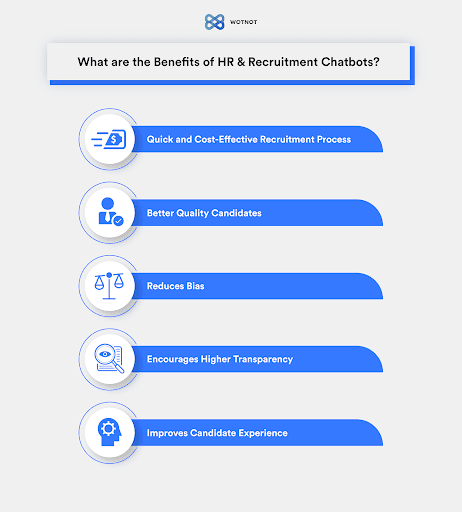
1. Quick and Cost-Effective Recruitment Process
A study by the Society of Human Resource Management found that the average cost of recruiting a single candidate was nearly $4,700 and the average time to hire was 42 days.
Even if we just keep these figures as a base, consider the time and costs saved by a chatbot that automates many processes in minutes.
In the initial process of recruitment, a lot of time and effort is invested in screening and qualifying the right candidates. AI recruiting tools and bots can automate repetitive tasks including collecting resumes, scheduling interviews and sending candidate follow-ups which gives you the time to make the most of your work week.
Once all this is done, the recruiters can quickly do their job and save a lot of time that they would otherwise spend answering the basic questions. It allows them to reduce the time in responding to candidates about their results and streamlines the overall recruitment process.
2. Better Quality Candidates
Out of all the resumes you receive, not every candidate is qualified, able, or even entirely interested in giving the interview. This makes the screening process difficult and time-consuming.
Recruiters have to ask the same screening questions to every candidate to gauge their quality and move them through the process.
When integrated with a recruiting CRM software, chatbots can automatically qualify candidates, sync responses with hiring workflows, and ensure only genuinely interested and suitable profiles move forward in the pipeline.
Enter recruitment chatbots.
You must be wondering, would the bots even be an ideal option for qualifying the candidates? The answer’s a big yes.
A survey also mentioned that most candidates are extremely comfortable speaking to a chatbot for recruitment and screening purposes. The result? The interviewer only gets qualified and interested candidates that have a higher chance of scoring an offer.
3. Reduces Bias
Regardless of the policies in place or having unbiased recruiters, subconsciously, biases always make their presence felt. It is natural for humans to have a soft corner for a certain section of people. But this can distort the overall hiring process.
Recruiters can end up favoring one because they are previously acquainted or do not favor a candidate because they belong to a certain community or gender.
No matter how much we try to make bots like humans, you know they can only replicate the tone, not the emotions, prejudices, or feelings that come so naturally to humans. And this fact works in favor of HR bots.
Chatbots for HR are designed in a manner that relies solely on conversational cues to suggest to candidates that they’re qualified for the next step in recruitment based on the screening questions. They bring much-needed objectivity in the recruitment process and give equal treatment to all candidates.
4. Encourages Higher Transparency
One thing candidates often complain about in the recruitment process is that companies don’t give timely replies.
After every process; be it the screening or interviews, the HR department often takes ages to get back to the candidates. Either the recruiters are occupied with other HRM objectives, or they miss out on giving feedback. It results in a poor candidate experience and hampers the brand image of being laid back and ignorant. Moreover, candidates have to wait before applying somewhere else or even keep their other offers on hold.
Chatbots in recruitment can fill this gap by constantly being available for communication between the candidate and the company. It encourages transparency in the application process as candidates are kept in a constant loop. It also ultimately reduces the efforts of the recruiters since they don’t have to manually inform every candidate of their application status and also saves them from giving a piece of bad news if any.
5. Improves Candidate Experience
Although a lot of companies aimed to make their HR processes candidate-centric, it wasn’t possible because of higher costs and limited staff. Candidates have many questions before considering applying or even before joining. Just as you need 24*7 customer support, you need the same for candidates as well.
Chatbots for HR is evolving in their speech and the ability to have human-like conversations. The role of AI in human resource management is to remove the barrier of the lack of connection that arises from a robotic tone.
Bots facilitate the three most crucial elements of providing a good experience which is speed, availability, and accuracy. If you can provide quality support immediately, it will likely create a positive experience for the candidates. It also increases the goodwill of the company as they ensure that the talent pipeline is treated with value and is given the needed support.
How Companies are Using HR Chatbots?
1. Answering FAQs
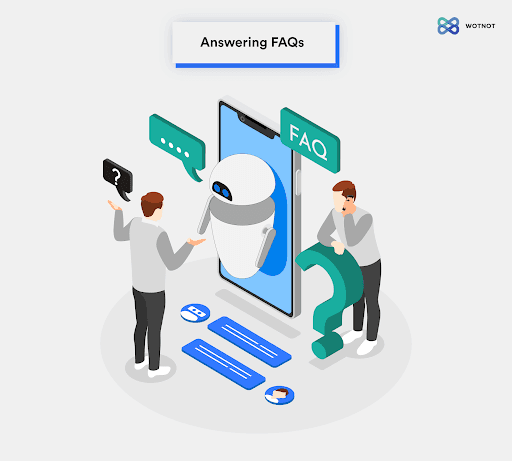
What are some of the most pressing questions a prospective candidate has while applying for a company? They’re pretty much similar for everyone and will have the same answers such as
What does the company do?
Where is the company located?
How much experience is required?
What salary can I expect?
What do I need to carry for the interview?
What are the office timings?
To automate this process, companies are building FAQ chatbots that answer all these questions. They prove to be convenient, especially when it comes to providing quick and easy answers.
How do they work?
You build an FAQ bot with an AI-powered talent intelligence system. This base allows you to add the questions as intents and utterances, and add responses. FAQ bots have machine learning capabilities that improve the accuracy of responses over time and transfer to a recruiter in case of a unique question.
2. Automating Pre-Screening and Other Processes
Screening is at the core of talent acquisition.
52% of recruiters prioritize the quality of candidates in the recruitment process. To achieve that, screening every candidate is important to understand if they are qualified to move forward.
Companies follow different methods for screening employees. Most base their parameters on setting:
Minimum qualifications
Preferred qualifications
Work experience
Must-have skill sets
AI-enabled chatbots for recruitment can then ask the candidates for their work experience, details of the previous company, reason for joining the company, expected salary, etc on the chat interface itself.
You include the screening criteria in the chatbot scripts when you build a chatbot for HR on a bot builder. The questions can be directed to assess the quality of the candidate for further procedure after weighing the answers. The bot analyzes the data and minimum requirements that the recruiters set for a specific position. It then sources the candidate list for the best match. It assigns scores and assesses the answers.
For example, consider the following conversation:
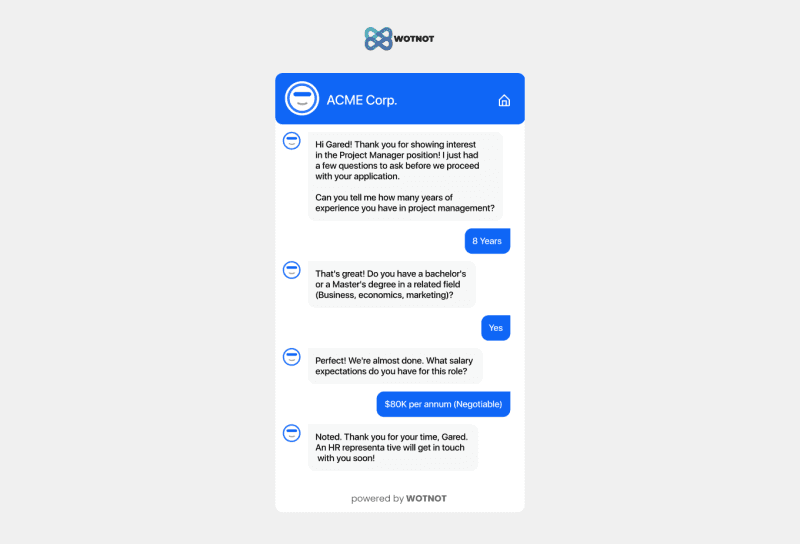
Since the candidate matches all the pre-screening requirements, in this case, the bot stores the same in the applicant database for further processes.
3. Scheduling Interviews
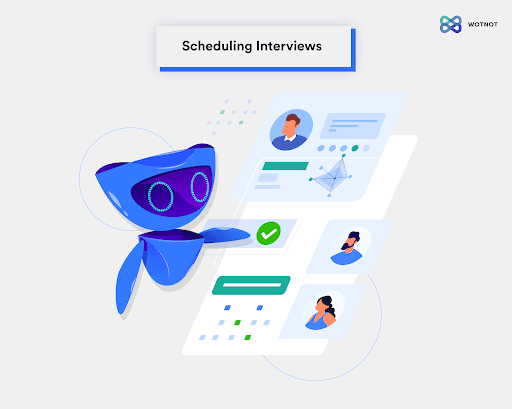
Scheduling interviews is an administrative task that can be and should be automated. Because there is a constant back and forth between the recruiter and the candidate about selecting an appropriate time that suits them both. There are numerous other barriers to scheduling such as:
Time zones
Prior appointments
Location
Imagine a candidate that goes through the pre-screening process on the HR chatbot. What if the candidate ticks all the boxes, and is given the opportunity to schedule an onsite interview or a phone call on the bot itself? Talk of making things easier.
Companies are integrating recruitment chatbots with scheduling tools like Calendly and Google Calendar to schedule their interviews. Since the bot has Google Calendar Integration, it only shows the available time slots from which the candidate can choose. On WotNot, you can also leverage outbound bots that send messages on other platforms like WhatsApp or SMS. Outbound chatbots for recruitment can send automated triggered messages once an action is performed. It can send notifications, collect interview feedback, and gauge the post-interview sentiments of the candidates.
4. Candidate Engagement
One of the top benefits of a conversational marketing tool like a chatbot is engagement. If a customer support chatbot increases customer engagement, a chatbot for HR increases candidate engagement. How so?
Let’s go back to the benefits.
Transparency in the hiring process
Quick and Accurate Replies
For companies struggling to keep up with every candidate, recruitment chatbots can engage candidates by being available and completing most first-level tasks such as followups, noting their expectations, explaining the job profiles, etc.
5. Employee Onboarding and Training
HR chatbots cover a lot more than recruitment. Owing to the rising virtual workspaces, bots for HR have considerably helped in onboarding new employees and providing them with training materials.
New joiners face a lot of challenges in learning and adjusting to the company procedures. Yes, they can definitely reach out to HR for a solution but imagine every single new employee disrupting the work of HR for a trivial query.
Here, companies are deploying chatbots for HR to encourage self-service. You can deploy an HR chatbot on the internal system or the messaging channel that lists down the company policies, benefits, training materials, reviews, and company-wide polls. It helps engage employees at scale and be available to their questions at all times.
This is especially true for small businesses that don’t have full-fledged HR departments. Chatbots for small businesses help owners onboard new employees and automate the initial training on the chat interface itself.
Finishing Thoughts
With so many benefits and use-cases, HR chatbots surely is something organizations need to act on. They’re worth the effort and are embraced by the world’s leading organizations.
HR chatbots automate key areas of human resource processes and boost productivity amongst employees. Be it for engaging candidates and employees all at once or keeping the brand reputation intact amongst prospective employees, HR chatbots aren’t just the virtual assistants that HR professionals want but what HR professionals need. It significantly helps firms to survive in the competitive recruitment market. If you’re on the lookout for setting up an HR chatbot, you can contact us or schedule a demo, and we’ll be delighted to help you get onboard.
ABOUT AUTHOR


Hardik Makadia
Co-founder & CEO, WotNot
Hardik leads the company with a focus on sales, innovation, and customer-centric solutions. Passionate about problem-solving, he drives business growth by delivering impactful and scalable solutions for clients.

Start building your chatbots today!
Curious to know how WotNot can help you? Let’s talk.

Start building your chatbots today!
Curious to know how WotNot can help you? Let’s talk.


